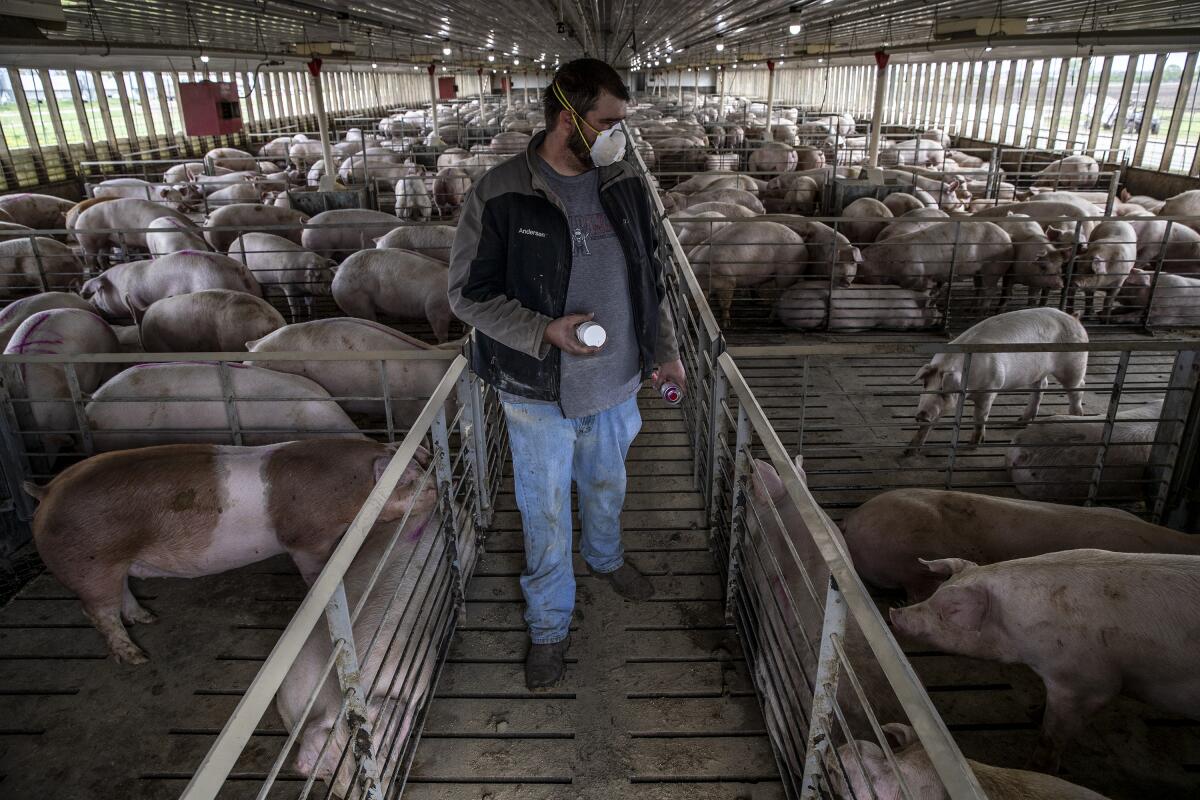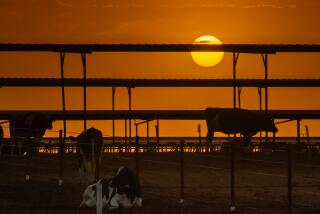Editorial: Pork producers should stop fighting animal welfare law giving pregnant pigs more space

Ever since Californians voted in 2018 to pass Proposition 12, a ballot measure that humanely requires more room on farms for egg-laying hens, veal calves, and gestating sows, pork producers have been fighting it. And in every federal district court and federal appeals court in which they asked for the law to be blocked, they have lost.
The pork producers and other groups asked the California Department of Food and Agriculture for more time — possibly as much as 28 more months — to prepare before the law was enacted. The agency said it had no authority to do that, and the law went into effect as intended on Saturday.
For the record:
8:30 a.m. Jan. 5, 2022The photo caption for an earlier version of this story misidentified the city in which the photo was taken.
Instead of spending their money on legal fees to fight the law, pork producers should have been spending it on revamping their hog farms to comply with the law. Some producers have already done so or are in the process.
Proposition 12, the Prevention of Cruelty to Farm Animals Act, requires the calves that will be served as veal, the hens that lay eggs for market, and the pigs that produce piglets to be killed and turned into pork have enough space to turn around, lie down, stand up, and fully extend their limbs. The point is to offer animals destined to become food for Californians a modicum of humane treatment during their short dismal lives.
But now the National Pork Producers Council and the American Farm Bureau Federation have appealed to the U.S. Supreme Court. In June, the high court turned down a request from meatpackers to block the parts of the law pertaining to veal calves and pigs. Now, the pork producers are arguing that California is violating the Commerce Clause of the Constitution by setting requirements on businesses outside the state. Federal district and appellate courts have already rejected that argument and so should Supreme Court justices when they consider the petition, which they are expected to do at the end of this week.
The pork producers note in their lawsuit that California has very few hog farms. Yet Californians buy about 13% of the pork produced in this country. So most of the pork sold in California comes from other states. The pork producers argue that the burden to retrofit farms and comply with regulations and inspections falls mostly on hog farms in other states selling pork to California — not on California farmers.
But, as the lower federal courts ruled, that’s permissible, because the new law applies to all hog farms, including those in California, that want to do business here. There is no legal problem because the law does not apply one rule for California and another for other states.
California has been on the forefront of protecting farm animals, and other states are following suit with a variety of farm animal welfare laws. Nine other states have passed bans on gestation crates — though not all are in effect yet — and 60 major food retailers such as grocery stores and fast food restaurants have pledged to phase out pork that comes from pigs in gestation crates. Pork producers should be thinking about how to adjust their operations to the increasing resistance to cramped crates.
No doubt conversions of hog farmers’ operations to comply is costly. But that’s the price of an important yet modest change to protect animals’ well-being and health. Egg farmers and veal producers, under an earlier deadline, have already complied.
Nearly 63% of California voters approved this law. It’s time for the people who make billions of dollars selling bacon and other pork products to Californians to do what their customers want and operate more humane farms.
More to Read
A cure for the common opinion
Get thought-provoking perspectives with our weekly newsletter.
You may occasionally receive promotional content from the Los Angeles Times.










